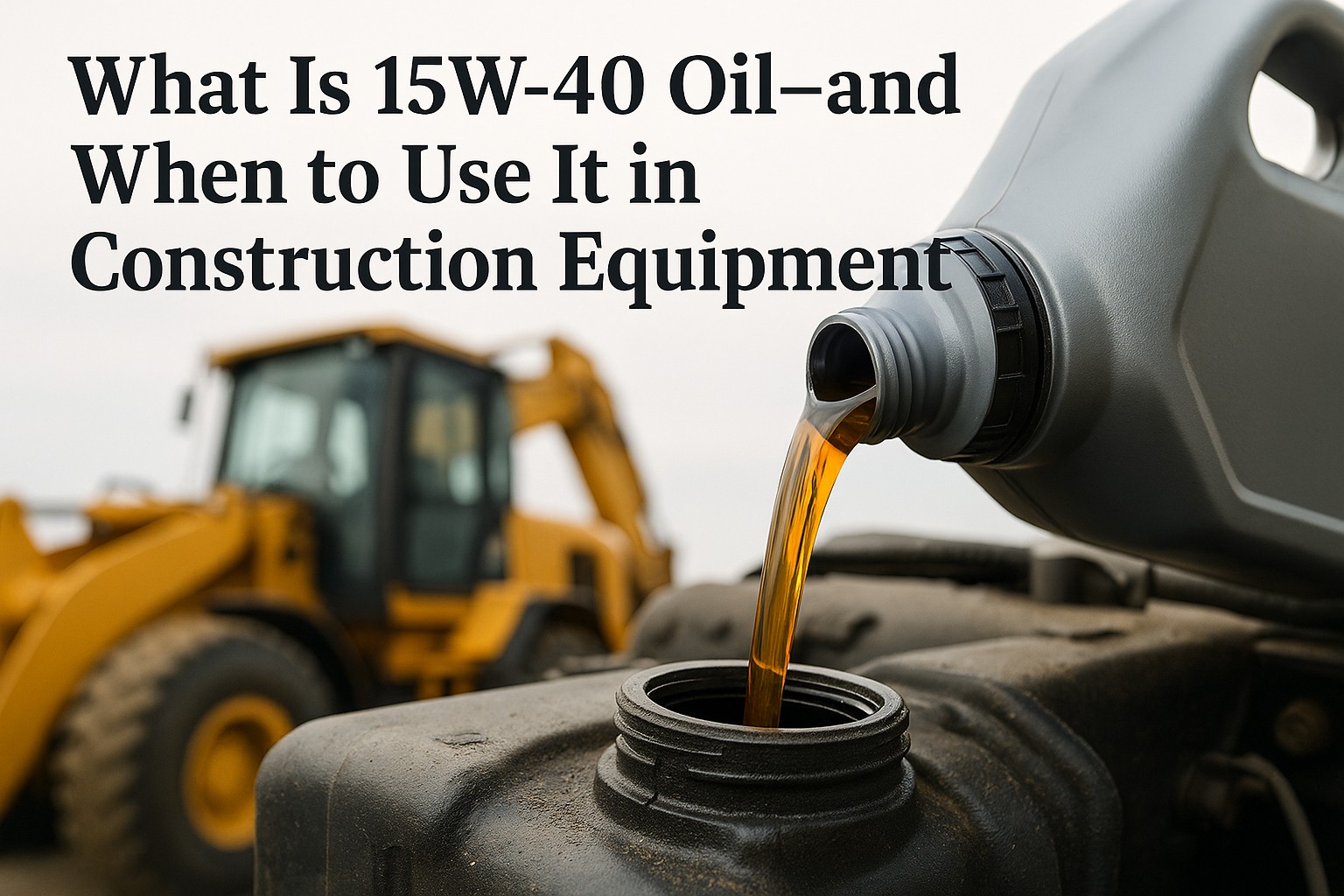Heavy equipment maintenance scheduling represents one of the most critical operational challenges facing fleet managers, with inadequate maintenance protocols costing an average of ₹12.5 lakhs per breakdown per machine. Industry data reveals that 78% of construction companies still rely on reactive maintenance approaches that create catastrophic failures, excessive downtime, and emergency repair costs. Systematic maintenance scheduling can reduce emergency repairs by 88%, extend equipment life by 45%, and decrease operational costs by 65% while ensuring regulatory compliance and maximum asset utilization across challenging operational environments.
The Hidden Crisis: Maintenance Scheduling Failures in Fleet Operations
Modern fleet operations depend on sophisticated equipment operating under extreme conditions, where even minor scheduling oversights can escalate into complete operational shutdowns that halt project progress and devastate operational budgets. Maintenance scheduling inefficiencies cascade throughout organizations, affecting equipment availability, project timelines, and total cost of ownership.
Daily Inspection Protocols
85% of equipment failures show detectable signs during daily inspections, including fluid leaks, unusual noises, and performance degradation that costs ₹8+ lakhs when unaddressed through systematic scheduling.
Weekly Service Requirements
Weekly maintenance indicators appear 2-4 weeks before major failures, with filter changes, lubrication needs, and calibration requirements signaling problems that require ₹15+ lakhs for major repairs.
Monthly Preventive Actions
Monthly maintenance schedules prevent 90% of hydraulic failures through systematic component inspection, fluid analysis, and replacement protocols costing ₹3+ lakhs when delayed.
Quarterly Deep Inspections
Quarterly assessments identify structural wear patterns and component fatigue before complete failure requiring ₹25+ lakhs replacement costs through comprehensive evaluation.
Annual Overhaul Planning
Annual maintenance scheduling creates cascading efficiency gains, with systematic overhauls preventing multiple system failures simultaneously costing ₹45+ lakhs in repairs.
Real-Time Schedule Optimization
Dynamic scheduling adjustments based on operating conditions and equipment performance optimize maintenance timing, extending service life by 40% while reducing costs.
The Financial Impact of Poor Maintenance Scheduling
Before implementing systematic maintenance scheduling, fleet operations experience significant inefficiencies that impact both operational performance and financial results:
- Unplanned downtime averaging 35-40% of available hours due to reactive maintenance and poor scheduling coordination
- Emergency repair premiums consuming 70% of maintenance budgets while providing minimal preventive value
- Equipment utilization below 60% due to overlapping maintenance schedules and poor resource allocation
- Maintenance cost unpredictability making budget planning difficult and causing project delays and penalties
- Regulatory compliance risks from missed inspections that can result in ₹50+ lakh penalty exposures
Optimize your fleet performance with professional maintenance scheduling systems
Getting Started Book a DemoFoundation Elements: Comprehensive Maintenance Scheduling Framework
Professional maintenance scheduling systems provide the operational framework necessary for systematic fleet management, incorporating manufacturer specifications, operational conditions, and predictive analytics into unified scheduling protocols that optimize equipment availability while minimizing total cost of ownership.
Core Scheduling Components and Architecture
Effective maintenance scheduling frameworks integrate multiple operational streams and resource coordination criteria to create comprehensive maintenance programs that balance equipment reliability with operational efficiency.
Equipment Health Monitoring Matrix
Comprehensive tracking systems including operating hours, performance metrics, environmental factors, and usage patterns that enable precise maintenance timing and resource optimization.
Maintenance Protocol Libraries
Detailed service procedures, interval specifications, resource requirements, and compliance protocols for all maintenance activities from routine inspections to major overhauls.
Resource Allocation Algorithms
Multi-variable scheduling logic incorporating technician availability, parts inventory, equipment priorities, and operational demands to optimize maintenance timing and efficiency.
Compliance Integration Systems
Regulatory requirement tracking, certification management, and audit trail capabilities to ensure maintenance activities meet safety requirements and warranty standards.
Advanced Scheduling Integration and Automation Capabilities
Smart Scheduling and Predictive Analytics Integration
Modern maintenance scheduling transcends manual planning to incorporate real-time equipment data, machine learning analytics, and automated resource coordination that optimizes maintenance timing weeks before traditional methods identify needs.
Condition-Based Scheduling
Real-time equipment monitoring systems automatically adjust maintenance schedules based on actual equipment condition rather than arbitrary time intervals, optimizing resource allocation.
Automated Resource Coordination
System-generated scheduling with technician assignment, parts procurement, and facility allocation that eliminates coordination delays and resource conflicts.
Predictive Schedule Modeling
Advanced algorithms that analyze equipment behavior patterns to predict optimal maintenance timing 4-8 weeks in advance, enabling planned resource allocation.
Integrated Workflow Management
Machine learning systems analyze maintenance history and operational patterns to optimize schedule sequencing and resource allocation for maximum fleet availability.
Implementation Methodology and Best Practices
Phased Deployment Strategy for Maintenance Scheduling Systems
Successful scheduling system implementation requires systematic deployment approaches that minimize operational disruption while maximizing scheduling effectiveness and resource optimization across diverse fleet compositions and operational environments.
Phase 1: Baseline Assessment
Current maintenance analysis, resource evaluation, scheduling requirement mapping, and system customization based on specific fleet composition and operational demands.
Phase 2: System Development
Custom scheduling protocol creation, resource allocation planning, compliance integration, and workflow optimization with existing maintenance and operational systems.
Phase 3: Pilot Implementation
Limited deployment with critical equipment units, technician training, scheduling accuracy validation, and workflow refinement to optimize system effectiveness.
Phase 4: Full Deployment
Fleet-wide implementation, comprehensive training programs, change management support, and ongoing optimization based on scheduling performance and operational feedback.
Change Management and User Adoption Strategies
Scheduling system implementation success depends heavily on technician adoption and cultural transformation, requiring comprehensive training programs and incentive structures that encourage systematic maintenance practices.
Technician Training Program Development
Role-specific training for maintenance technicians, supervisors, and managers covering scheduling systems, resource coordination, and compliance procedures.
Performance Incentive Alignment
KPI structures and reward programs that recognize schedule adherence, resource efficiency, and successful preventive maintenance achievements.
Communication and Feedback Systems
Regular communication channels for scheduling updates, efficiency improvements, and user feedback integration to ensure continuous optimization.
Champion Network Development
Identification and development of scheduling champions who support system adoption and provide peer-to-peer training and technical support.
Accelerate your maintenance scheduling transformation with expert implementation support
Getting Started Book a DemoAnalytics and Performance Monitoring Capabilities
Advanced Scheduling Analytics and KPI Tracking
Maintenance scheduling analytics transform operational data into actionable insights that enable continuous improvement, efficiency optimization, and predictive planning across equipment fleets and operational environments.
Real-Time Scheduling Dashboards
Executive and operational dashboards providing immediate visibility into maintenance status, resource utilization, and schedule adherence across all fleet segments.
Predictive Schedule Analysis
Advanced analytics identifying maintenance optimization patterns, resource allocation trends, and efficiency opportunities based on historical and real-time scheduling data.
Cost Optimization Analytics
Comprehensive analysis covering maintenance efficiency, resource utilization, and schedule optimization that quantify scheduling system value and ROI measurement.
Compliance Monitoring Systems
Automated compliance tracking ensuring maintenance activities meet regulatory requirements, manufacturer warranties, and safety standards with exception reporting.
ROI and Operational Excellence Outcomes
Quantifiable Financial Benefits and Cost Optimization
Systematic maintenance scheduling delivers measurable financial returns through multiple value streams that extend beyond direct maintenance cost savings to encompass operational efficiency, equipment longevity, and regulatory compliance benefits.
Operational Efficiency and Competitive Advantages
Comprehensive maintenance scheduling creates operational advantages that enhance competitive positioning through improved equipment reliability, predictable maintenance costs, and enhanced project delivery capabilities.
- Improved project schedule reliability with predictable equipment availability and minimal maintenance-related disruptions
- Enhanced equipment utilization averaging 95%+ availability compared to 70% with reactive maintenance approaches
- Reduced insurance premiums through documented maintenance programs and improved safety performance records
- Increased equipment resale values with comprehensive maintenance documentation and proven reliability history
- Better cash flow predictability through planned maintenance budgets and eliminated emergency repair expenses
Compliance and Regulatory Alignment
Regulatory compliance requirements make systematic maintenance scheduling essential for fleet operations, with safety standards, environmental regulations, and insurance requirements demanding proactive maintenance planning and documented compliance programs.
Safety Standard Compliance
OSHA and safety regulations requiring systematic equipment maintenance and inspection scheduling, with proper systems ensuring compliance and reducing violation risks that can cost ₹35+ lakhs per incident.
Environmental Regulation Adherence
Emission control maintenance and environmental protection standards demanding proper scheduling to ensure regulatory compliance and sustainability objectives.
Insurance and Risk Management
Insurance carrier requirements for systematic maintenance programs and scheduling compliance, with proper systems reducing premiums and claim exposures significantly.
Warranty Protection and Documentation
Manufacturer warranty requirements for proper maintenance scheduling and documentation, with systematic programs protecting warranty coverage and reducing replacement costs.
Future Outlook and Innovation Roadmap
The maintenance scheduling landscape continues evolving with emerging technologies that promise enhanced accuracy, automated resource coordination, and predictive maintenance integration that will further improve equipment reliability and operational efficiency.
Artificial Intelligence Integration
Advanced AI algorithms providing enhanced scheduling optimization, resource allocation, and automated maintenance coordination based on complex operational data analysis.
IoT Sensor Integration
Internet of Things technologies enabling continuous equipment health monitoring and automatic schedule adjustment based on real-time operational conditions.
Augmented Reality Maintenance
AR-enabled maintenance tools providing technicians with real-time scheduling information, procedure guidance, and expert system support for complex maintenance tasks.
Blockchain Documentation
Immutable maintenance records and scheduling documentation providing enhanced warranty protection, compliance verification, and equipment history validation.
Frequently Asked Questions
Ready to implement comprehensive maintenance scheduling for your construction fleet?
Getting Started Book a Demo.png)



